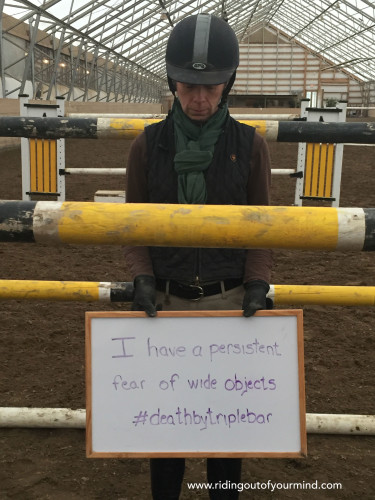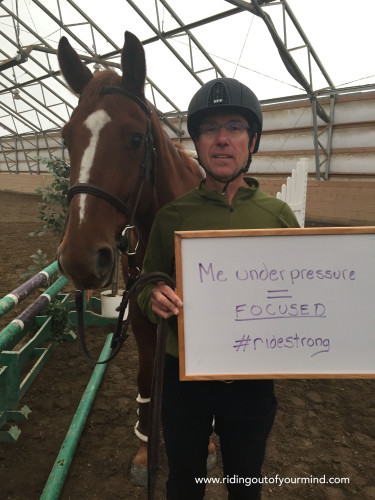I am not good enough.
I don’t have an equitation body.
I’m too nervous, I’m such a wimp.

Pretty discouraging isn’t it?
Have you ever tried to shame yourself into better riding?
Shame goes beyond garden-variety negativity. The message you send to yourself is “I am bad/worthless.” The implication is that there is something wrong with you as opposed to you having done something wrong. You label yourself so that everytime something goes wrong with your ride, you can say “I knew it, I am just hopeless.”
What’s the antidote to self-shaming?
Put the critic on a short leash
Figure out how you will respond to your inner shame maker. Try something like “tThanks, but maybe you can get back to me when you have something useful. Now, if you’ll excuse me, I have to get back to problem-solving.”
The critic is not a helpful coach by any means—its only function is to label and shame. So decide that you will not listen to judgment, only to constructive feedback. Then shift your focus to just that: what do I need in order to move forward? Ask for feedback, study the problem systematically and then identify your goals. Defy the critic with a solid plan for better riding.
Define yourself
When you give into shame, you allow old voices and not-so-nice new internal ones to be the “decider” of your riding ability, which hardly seems fair, or productive. So why not take this task of defining yourself into your own hands. Do you really want to know yourself as a fearful Chicken Little with multiple phobias or a competent rider who knows how to get the job done? Think about it. Your words matter. They add up to statements, to expectations, and to behavior.
So re-label yourself. Write out three or four statements about what qualities define you, like:
I am the type of rider that loves to solve challenges.
I am the type of rider who is known for her strong work ethic.
One word I would use to describe me under pressure is focused.
When unexpected things happen, I can always be counted on to keep moving.
When you are building your goals, make sure to include actions that support your identity. For example, if you want to be known as someone with a strong work ethic, then your goals might be to be on time for lessons and ride without stirrups once a week. You get the idea.
 Identify and honor your strengths
Identify and honor your strengths
It’s really easy to get focused on the negative and forget what you do have in your skills bank. Taking the time to honor your strengths can be a great season end job that leads nicely into goal setting for winter training or a routine to do before a show.
Make a list of what you are really skilled at as a rider. Be specific. Call it naming your super strengths—define yourself as having and using them.
Keep this list in a location where it’s easy to review. Use it when you’re having a bad day, when your shame monster is having tantrums. It can act as a visual cue to activate that inner nice coach, the one that will help you navigate any challenge.
About the Author
April Clay is a rider and sports psychologist in Calgary, Alberta. Check out her site www.ridingoutofyourmind.com and selection of online equestrian sport psychology courses, including the Confidence Factor and Riding Through Fear, at www.outofyourmindcourses.com




 April 15, 2016
April 15, 2016 























